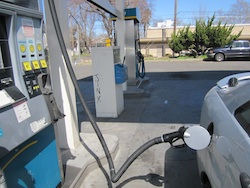 According to a new study released today by Iowa State University and the University of Wisconsin, in 2010, on average the use of ethanol reduced wholesale gasoline prices by an average of .89 cents per gallon. The research was conducted by a number of economists and released by the Center for Agricultural and Rural Development (CARD) and is an update to a 2009 Energy Policy paper authored by professors Dermot Hayes and Xiaodong Du. The paper, sponsored by the Renewable Fuels Association (RFA), also found that the growth in ethanol production reduced gasoline prices by an average of $0.25, or 16 percent while it was even more significant in the Midwest with an average price per gallon reduction of .39 cents.
According to a new study released today by Iowa State University and the University of Wisconsin, in 2010, on average the use of ethanol reduced wholesale gasoline prices by an average of .89 cents per gallon. The research was conducted by a number of economists and released by the Center for Agricultural and Rural Development (CARD) and is an update to a 2009 Energy Policy paper authored by professors Dermot Hayes and Xiaodong Du. The paper, sponsored by the Renewable Fuels Association (RFA), also found that the growth in ethanol production reduced gasoline prices by an average of $0.25, or 16 percent while it was even more significant in the Midwest with an average price per gallon reduction of .39 cents.
“This study confirms that ethanol is playing a tremendously important role in holding down volatile gasoline prices, which are currently inching closer to all-time record highs,” said RFA President Bob Dinneen. “As rising oil prices are contributing to higher retail costs for everything from gas to food to clothing, ethanol is clearly providing some real relief for American families.”
The CARD study also showed that the impact of ethanol on gasoline prices in 2010 was even more significant than the average over the past decade. “In 2010 alone, ethanol reduced the average American household’s gasoline bill by more than $800,” said Dinneen. The number was derived from using data published by the Federal Highway Administration, Environmental Protection Agency, and Department of Energy. The organizations show that the average household consumed 900 gallons of gasoline at an average price of $2.74 per gallon in 2010. That means the average family’s annual gasoline bill was $2,470, but it would have been closer to $3,270 without ethanol.
 Also examined was the impact of removing ethanol from the fuel supply. Today ethanol represents approximately 10 percent of the supply and the authors found that “Under a very wide range of parameters, the estimated gasoline price increase would be of historic proportions, ranging from 41% to 92%.” At today’s prices, that means gasoline prices would increase from roughly $4 per gallon to $5.60-$7.70 per gallon.
Also examined was the impact of removing ethanol from the fuel supply. Today ethanol represents approximately 10 percent of the supply and the authors found that “Under a very wide range of parameters, the estimated gasoline price increase would be of historic proportions, ranging from 41% to 92%.” At today’s prices, that means gasoline prices would increase from roughly $4 per gallon to $5.60-$7.70 per gallon.
The authors point out that this dramatic price increase would stem from the fact that “…the ethanol industry now provides approximately 10% of the gasoline used in automobiles, an amount that exceeds the spare capacity of US oil refineries.” If ethanol suddenly disappeared, they say “[the] ‘missing’ fuel would have to be imported in the short run, and the required volume would be large relative to available import supplies. The only way to solve this short-term supply problem would be to use high gasoline prices to ration demand.”
Dinneen concluded this finding alone should serve as a wake-up call to those who are seeking to reduce or eliminate the role of ethanol in the U.S. energy market at a time when oil markets are increasingly volatile.

